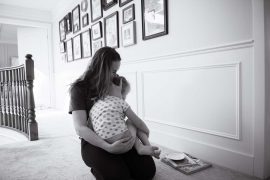By Jennifer McGrail
Maybe money’s tight. Maybe you’re not sleeping well. Maybe you’re dealing with health issues, or with the health issues of a loved one. Maybe you’re just plain TIRED, and when your three-year-old has her seventh tantrum of the day, while you may want to respond with patience and understanding, your first knee-jerk thought might well be, “Are you freaking KIDDING ME??”
No matter how committed you may be to parenting gently, and no matter how much you love your kids, you’re still a human, dealing with your own human emotions.
Here are a few things to help get you grounded again when you’re about to lose it:
1. Breathe. It’s said so often that it feels like its a cliche, but it’s not. Consciously stopping to breathe is the very best first line of defense against any emotionally charged situation, bar none. It sends oxygen to your body, calms your heart rate, lowers your blood pressure, and reduces the flight or fight response. Before you speak, before you do ANYTHING….. breathe. And then:
2. Slow down. I love this one because it seems so counter-intuitive. When everything’s crazy, and you’re in a hurry, and you’re rushing around, and everything’s going wrong… slowing down seems like the least helpful thing you can do. But it’s essential to keeping your cool. Slow down, take a step a back, and regroup. You’ll be more productive, you’ll make less mistakes, and you’ll be much less likely to say things you’ll regret.
3. Focus on the current moment only. We are so, so good at stressing out about the past, and worrying about the future. So, so good! The problem is, it takes us out of the current moment, and makes it that much harder to respond with patience and calm. Breathe, slow down, and focus on making THIS moment a kind one. Just this one.
4. Put yourself in your child’s shoes. Empathy is one of the greatest tools we have when it comes to relating to other people, our children included. How is she feeling right now? What is he going through? It is HARD to be a toddler (and a preschooler and a middle-schooler and a teenager). It’s hard to be a human. Life can be frustrating. Remembering that your child is having a hard time with something goes a long way toward making it more about the person, and less about the behavior. It’s not personal. They’re not trying to annoy you. Rather, they’re trying to communicate in the only way they know how at the moment. Remember a time you felt the same way, and treat your child the way you wish you’d been treated. They need your compassion, not your anger.











